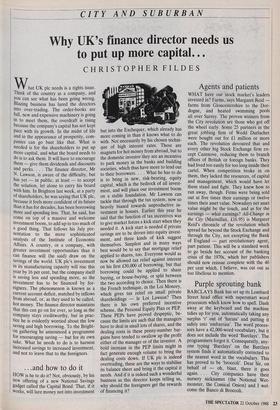. ..and how to do it
HOW is he to do it? Not, obviously, by his new offering of a new National Savings gadget called the Capital Bond. That, if it works, will lure money not into investment but into the Exchequer, which already has more coming in than it knows what to do with. Not necessarily by his chosen techni- que of high interest rates. These are magnets for hot money from abroad, but to the domestic investor they are an incentive to park money in the banks and building societies, which thus have more to lend out to their borrowers. . . . What he has to do is to bring in new, risk-bearing, equity capital, which is the bedrock of all invest- ment, and will place our investment boom on a stable foundation. Mr Lawson can tackle that through the tax system, now so heavily biased towards unproductive in- vestment in houses. Earlier this year he said that the function of tax incentives was to give market forces a kick start when they needed it. A kick start is needed if private savings are to be driven into equity invest- ment, and three kinds of kick suggest themselves. Simplest and in many ways best would be to say that mortgage relief applied to shares, too. Everyone would as now be allowed tax relief against interest on his first £30,000 of borrowing, but that borrowing could be applied to share buying, or house-buying, or split between the two according to choice. Then there is the French technique, in the Loi Monory, which gives tax relief on small private shareholdings — le Loi Lawson? Then there is his own preferred incentive scheme, the Personal Equity Plan or PEP. These PEPs have proved dyspeptic, be- cause the limits are such that the managers have to deal in small lots of shares, and the dealing costs in these penny-number bar- gains have tended to swallow up the profit either of the manager or of the investor. A bold increase in the PEP limits might in fact generate enough volume to bring the dealing costs down. If UK plc is indeed overtrading, these are the ways to stabilise its balance sheet and bring it the capital it needs. And if it is indeed such a wonderful business as this director keeps telling us, why should the foreigners get the rewards of financing it?


































































 Previous page
Previous page